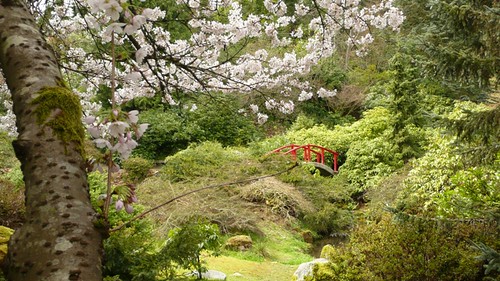In spite of that fact that we had hail the size of rock salt yesterday afternoon and temperatures in the 30s at night, it is indeed spring in the Pacific Northwest. The days are longer — a few days ago I watched the evening light change until well past 8pm, nested on my couch facing northwest, the direction of the summer sunsets. And last weekend, even though the weather looked more November than April, I saw cherry blossoms in Kubota Garden.
The garden is an undervisited gem in south Seattle, it’s in an odd location in a residential neighborhood that feels like one of those “you can’t get there from here” places. It’s got all the required things for a Japanese garden, things line up in surprising ways that you don’t notice at first, there’s a bridge in that distinctive Chinese red color, plants are aggressively shaped to look hypernatural, and of course there are water features with stepping stones or elegant walkways across them. Couples walked around holding hands, taking picture of each other (ourselves included), little kids squealed at the ducks, ducks ignored little kids, parents hollered at toddlers to be careful, already, don’t fall in that water, we don’t have extra clothes for you in the car and if you get wet so help me… a-hem. Said parents were replaced by good looking hipsters one carrying a, huh, is that a tuba? The girls wore pretty summer dresses and rubber boots, the boys looked cool in white shirts and skinny ties, maybe a band photo session? Maybe some wedding pictures, prior to the big day? Up at the top of the park, a single red rose lay wrapped in cellophane under a bench on top of a note: Please don’t touch leave for Sunday thank you. I hope the romantic was successful in his or her pursuits.
Mr. Kubota started his garden in 1927. He had no training, but he must have had quite the passion — he went on to become a well known and rather successful landscaper while his garden became a social and cultural center for the local Japanese community. The Kubota family was interned — I hate that word, let’s just say imprisoned — for four years during World War II. When they were released, they rebuilt the business and revitalized the garden. Mr Kubota died in 1973 at 94 years old. His garden was saved from condo developers by community efforts to have it designated a historical landmark. It’s now maintained by Seattle Parks and Rec, it’s free and open to the public. And right now, lots of things are flowering there. You should go.
History culled from the Kubota Gardens website. Here’s a map. And our photos? They’re here.


Amazing pictures. Your blog really made the garden come to life. I can’t wait to go next time I’m in Seattle.
Nice writing. You are on my RSS reader now so I can read more from you down the road.
Allen Taylor